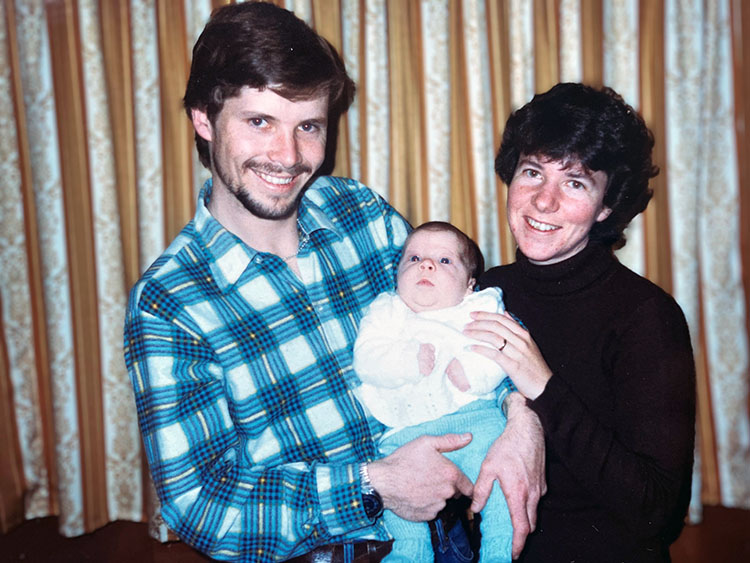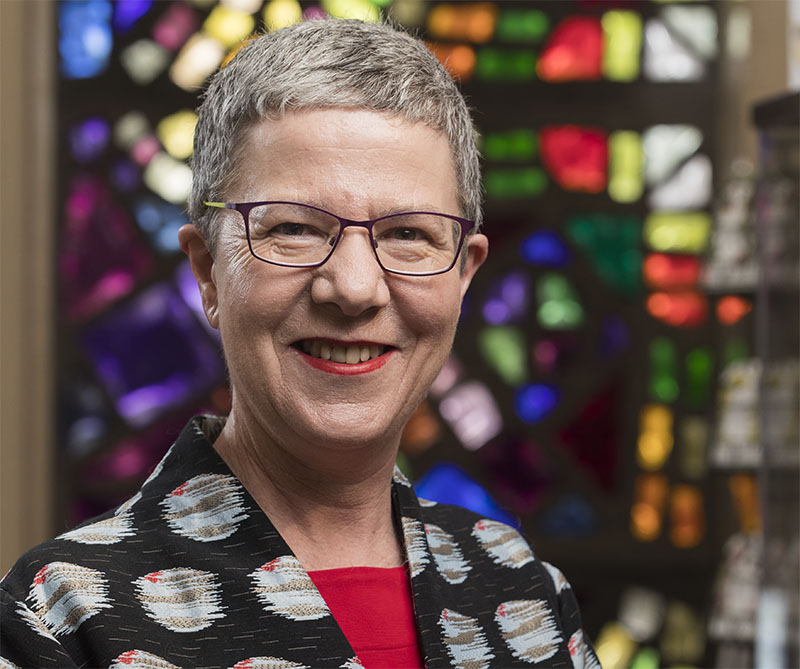Beyond the scholarship and introduction to the wonders of Emily Dickinson, it is the kindness she was shown that Dr Marie-Louise Ayres, Fellow of the Australian Academy of the Humanities, recalls of UNE study in the early 1980s.
Today’s Director-General of the National Library of Australia (NLA) was not quite 18 when she and her then boyfriend Russell arrived to study English and History.
“We married a year later and got pregnant a bit faster than we had planned; the teaching staff were very accommodating,” Marie-Louise says. “There was no childcare on campus or in town at that time, so we would take our baby to classes. It wasn’t always easy. I often think back to the kindness we were shown by many of those who taught us and the profound impact that had.”
 Marie-Louise, Russell and their first baby, taken during their UNE studies
Marie-Louise, Russell and their first baby, taken during their UNE studies
The couple, who recently celebrated their 42nd wedding anniversary, were “as poor as church mice” but were rewarded for their studiousness. “We received a really high standard of education; we were taught by fine minds who were great humanists. I remember Ken and Elaine Moon and Elizabeth Lawson incredibly fondly, and we maintained relationships with them right up until they died.
“It was a gift that students of our generation could go to university and study what we absolutely loved, not because we thought it would be useful or would provide a pathway to a job, but because it was what engaged our best intellectual selves and gave us the best opportunity for growth. That’s what UNE gave us.”
Marie-Louise also remembers “the brute of a Dixson Library” but had no intention of making a career in libraries until she “accidentally stumbled into” a role at the UNSW ADFA Library at the end of her PhD at the Australian National University. She soon became head of manuscripts and then led the three-year AusLit project that brought together several literary databases. More than 20 years later, AusLit continues to thrive.
“I realised I had a brain suited to thinking about big systems and particularly digital systems,” Marie-Louise says. “My 30-year library career has always been around two tracks of caring deeply about content, especially literature, and understanding the power that the digital world gives us to put information back into the hands of ordinary people. It wasn’t planned, but once I started in the library world, I found somewhere that I thought I could flourish.”
Marie-Louise joined the NLA in 2002 to manage the online Music Australia service, before being appointed Curator of Manuscripts, then Senior Curator Pictures and Manuscripts, then as the member of the executive team responsible for Trove, and finally – in 2017 – as Director-General. She considers her leading role in developing the transformative Trove digital archive – which makes the NLA collection and that of nearly 1,000 other libraries and cultural institutions freely available online – one of her greatest contributions.
Which is why, last year, she fought so hard to maintain its funding. “It empowers every Australian to engage, if they wish to, with the myriad stories that make up this country and those around us,” Marie-Louise said.
But for all that digital capability, Trove would be nothing without the NLA collections that underpin it – about 10 million physical items and terabytes of digital files collected by generations of people over many decades.
Ongoing, indexed funding has now been assured for Trove, but there are other immediate challenges for the Director-General – like securing extra storage for archival material, ensuring the library and its workforce reflects the rich diversity of Australia, and capitalising on artificial intelligence and machine learning opportunities.
“We have had some exciting proofs of concept that I think will allow us to wring even more meaning from the amazing collections we already have and make more of them searchable,” Marie-Louise said. “We know our collection will live much longer than we do. I want to see us get out of the way of the user so they can choose their own adventure and make what they will of the material.
“Libraries are a very important part of our democratic infrastructure. There’s a spirit of egalitarianism about the NLA collections that reflects Australian life. They are wild and unruly, untameable and gloriously diverse.”


